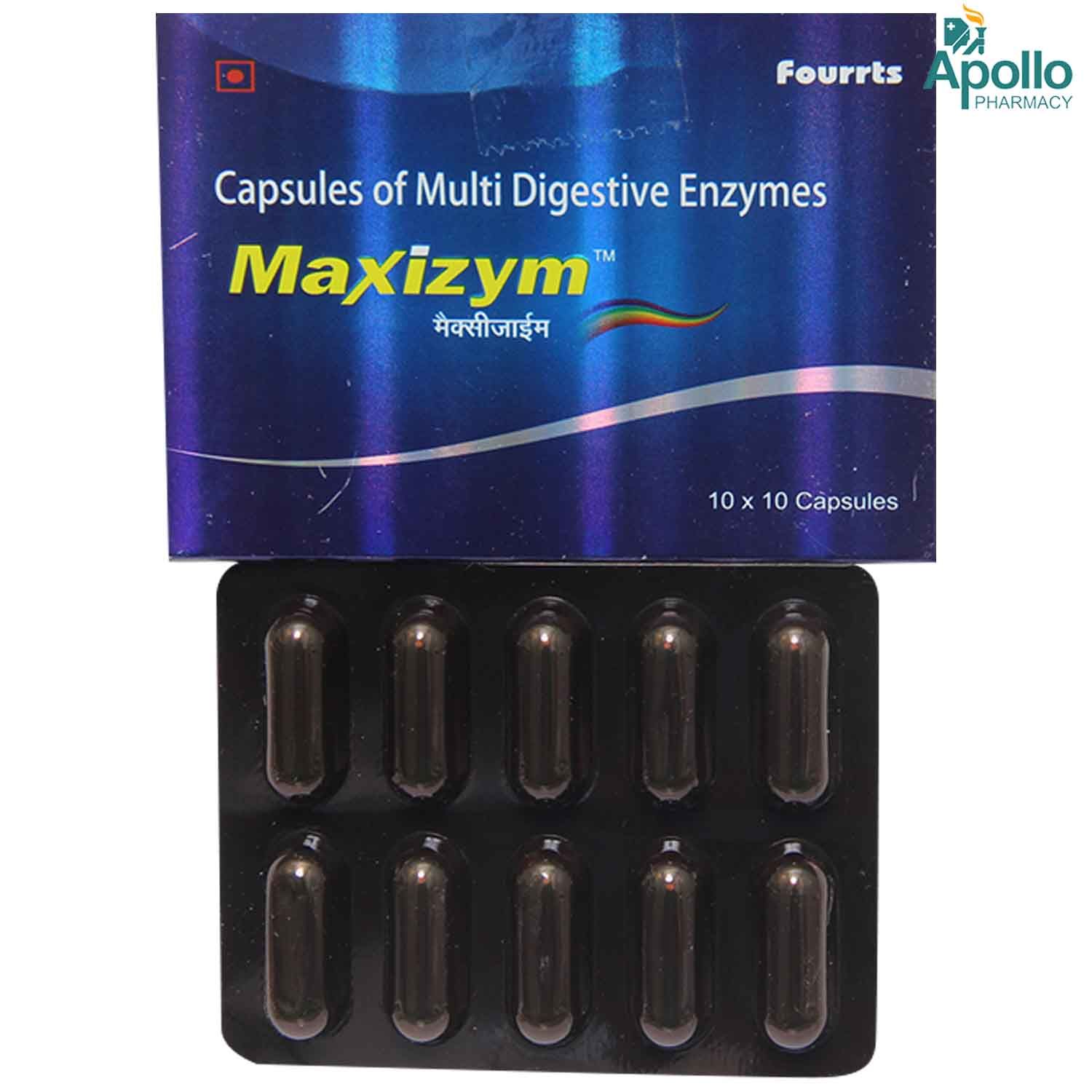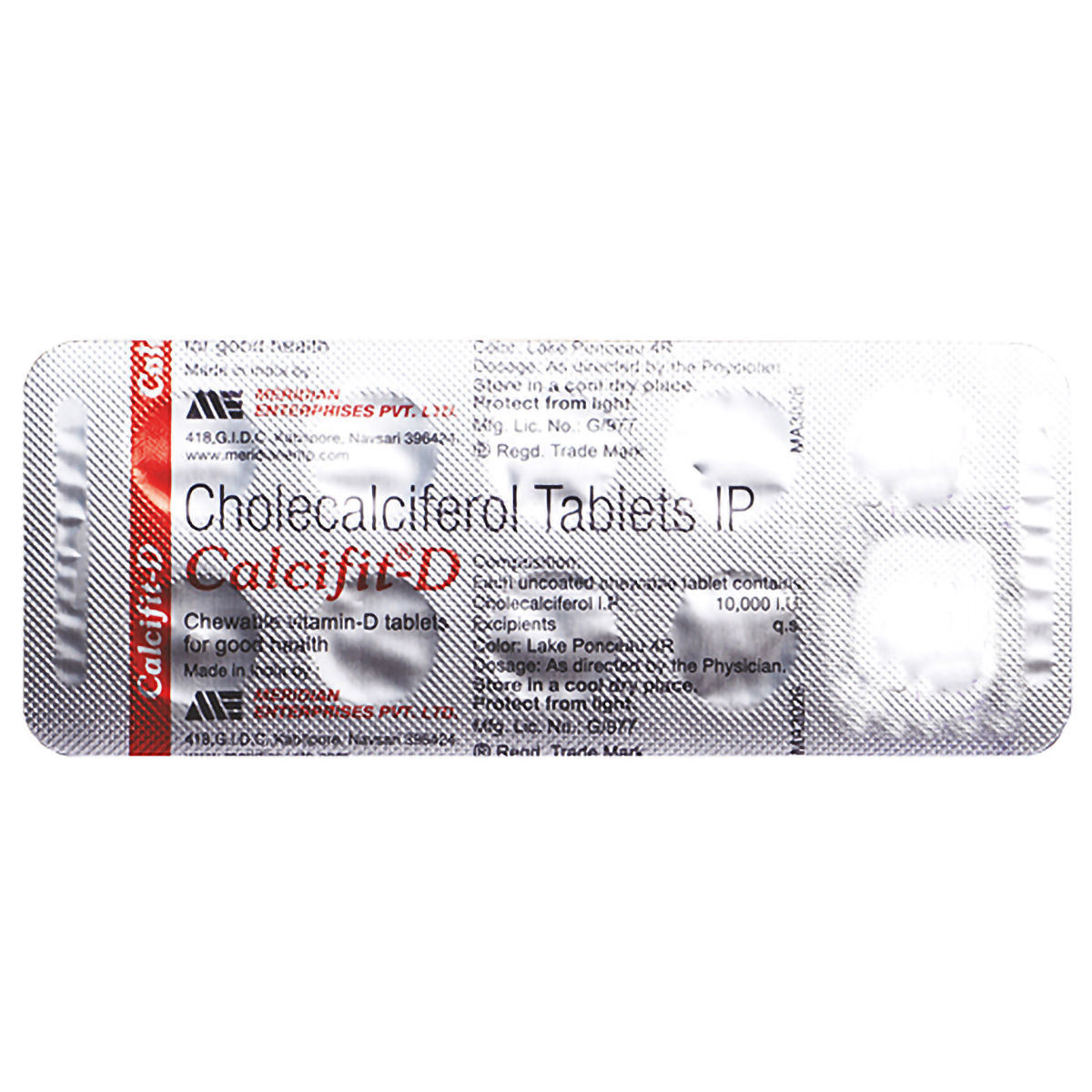Vitamin D3
About Vitamin D3
Vitamin D3 is used to treat low blood calcium levels. Vitamin D3 effectively treats various conditions in the body like Vitamin D deficiency, osteoporosis (weak and brittle bones), hypoparathyroidism (parathyroid glands make low levels of calcium in the body), latent tetany (a muscle disease with low blood calcium levels) and rickets or osteomalacia (softening or deforming of bones due to lack of calcium). Vitamin D deficiency occurs when your body has low Vitamin D levels and is caused due to inadequate nutrition, intestinal malabsorption or lack of sunlight exposure.
Vitamin D3 contains 'Vitamin-D3' (Cholecalciferol). It helps maintain blood calcium and phosphorus levels and the mineralization of bone. It is used to treat and prevent bone disorders, such as rickets and osteomalacia. It aids in calcium absorption, enabling bone growth and repair. It further prevents cartilage degeneration.
Your doctor will decide the dosage based on your medical condition. Vitamin D3 is likely safe to use. In some cases, it may cause side effects like constipation, vomiting, and nausea. These side effects do not require medical attention and gradually resolve over time. If these side effects persist, please consult your doctor immediately.
If you take any medicines or supplements, inform your doctor before starting Vitamin D3. If you are allergic to Vitamin D3 or any other medicines, inform your doctor before starting Vitamin D3. Pregnant or breastfeeding women should consult their doctor before taking Vitamin D3. This supplement does not interfere with your driving ability. Limit alcohol intake while using Vitamin D3. This supplement is recommended for children when advised by a doctor.
Uses of Vitamin D3
Medicinal Benefits
Vitamin D3 contains Vitamin D3 (Cholecalciferol). It is a steroid hormone produced in the skin when exposed to ultraviolet light or obtained from food sources. It is a provitamin that is converted into a vitamin after intake. It helps maintain blood calcium and phosphorus levels and the mineralization of bone. Vitamin D3 is also used in the treatment of familial hypophosphatemia (a group of rare inherited disorders characterized by impaired kidney conservation of phosphate and in some cases, altered vitamin D metabolism).
Directions for Use
Storage
Side Effects of Vitamin D3
- Constipation
- Nausea
- Vomiting
Drug Warnings
Vitamin D3 should be used with caution in hypercalcemia, renal impairment, electrolyte imbalance, heart diseases, kidney stones and hypervitaminosis D. Tell your doctor if you are allergic to Vitamin D3. Chewable tablets of Vitamin D3 may contain sugar or aspartame, hence caution should be taken in diabetes and phenylketonuria. Please check the product leaflet before consumption. Pregnant or breastfeeding women should consult their doctor before taking Vitamin D3. Higher doses of Vitamin D than the recommended daily dose should be used in pregnant women only when advised by the doctor. Vitamin D3 is safe to use in children when advised by the doctor.
Drug Interactions
Drug-Drug Interaction: Vitamin D3 may interact with drugs treating high cholesterol levels (cholestyramine), anti-epileptic (carbamazepine, phenobarbital), antibiotics (doxycycline, neomycin, and chloramphenicol), drugs treating bone loss (alendronate), thyroid hormone (levothyroxine), diuretics (hydrochlorothiazide) and heart-related medicines (digoxin).
Drug-Food Interaction: Limit alcohol intake during the course to get the maximum benefits of Vitamin D3.
Drug-Disease Interaction: Let your doctor know if you have hypercalcemia, hypervitaminosis D, malabsorption syndrome (difficulty absorbing nutrition from food), Vitamin D toxicity, heart/kidney/liver/blood vessel diseases, and kidney stones before using Vitamin D3.
Drug-Drug Interactions Checker List:
Safety Advice

Alcohol
cautionIt is advisable to limit/avoid alcohol intake during the treatment. Please consult a doctor before consuming alcohol while using Vitamin D3.

Pregnancy
consult your doctorInform your doctor if you are pregnant before taking Vitamin D3.

Breast Feeding
consult your doctorPlease consult your doctor if you are a nursing mother before taking Vitamin D3.

Driving
safeVitamin D3 usually does not interfere with your driving ability.

Liver
cautionInform your doctor if you have any history of liver diseases before taking Vitamin D3. Liver impairment can alter the metabolic and therapeutic activity of certain Vitamin D forms.

Kidney
cautionIt is advised to seek your doctor's advice before starting Vitamin D3 if you have kidney diseases like kidney stones or undergoing dialysis.

Children
consult your doctorVitamin D3 should be used in children only when advised by a doctor. Dose adjustment may be necessary.
Habit Forming
Diet & Lifestyle Advise
Include dairy products like milk, yoghurt, cheese or milk-based custard in your diet.
Eat daily a serving of broccoli, cabbage, bok choy, spinach and other green leafy vegetables.
Include the best dietary sources of vitamin D, such as fish liver oils and vitamin D–fortified milk.
Snack on calcium-rich nuts like Brazil nuts or almonds.
Spend time under the sunlight for at least 30 minutes early in the morning.
Sprinkle sesame seeds over your food, vegetables and salads. Sesame seeds are high in calcium.
Avoid or reduce the intake of caffeine, soft drinks and alcohol that inhibit calcium absorption.
Replace the meat with tofu or tempeh for extra calcium in your food.
Special Advise
It is advised to timely monitor your Vitamin D levels through blood examination.
Patients Concern
Disease/Condition Glossary
Vitamin D deficiency: When a person cannot get enough Vitamin D through food and exposure to sunlight, it leads to vitamin D deficiency. It often leads to thin, brittle, or misshapen bones.
Osteoporosis: It is a bone disease that makes the bones weak and brittle by decreasing bone density.
Tetany: A disease condition due to low calcium levels (hypocalcemia) in the body that causes cramps and spasms in the hands, feet, and larynx (voice box).
Osteomalacia/Rickets: A disease caused by softening and weakening of bones in children due to inadequate vitamin D.
Hypoparathyroidism: It is a disease characterized by low levels of parathyroid hormone. This can cause low calcium levels and trigger tetany (muscle cramps, spasms, or tremors).
FAQs
Vitamin D3 is used to treat vitamin D deficiency. It effectively treats various conditions in the body like low calcium levels, osteoporosis (weak and brittle bones), hypoparathyroidism (parathyroid glands make low levels of calcium in the body), latent tetany (a muscle disease with low blood calcium levels)Â and rickets or osteomalacia (softening or deforming of bones due to lack of calcium).
Vitamin D3 is a dietary supplement that consists of Vitamin D3 (Cholecalciferol). It helps maintain blood calcium and phosphorus levels and the mineralization of bone. When you don't get enough Vitamin D from food sources and sunlight exposure, Vitamin D3 helps replenish those low levels.
Vitamin D3 should be used with caution in conditions like hypercalcaemia (high calcium levels), hypervitaminosis D (high vitamin D levels), liver/kidney problems, heart diseases, phenylketonuria (increased phenylalanine levels in the blood), and diabetes.
If you miss a dose, take it as soon as you remember. However, if it is time for the next scheduled dose, skip the missed dose and follow your usual dosage.
Antacids usually do not interfere with the absorption of Vitamin D3. However, it is advised to take Vitamin D3 two hours before or four hours after taking antacids.
Fatty fish (tuna, trout, salmon, and mackerel), fish liver oil, egg yolk, and beef liver are good sources of Vitamin D. Vitamin D-fortified foods like plant milk, dairy, juices, and breakfast cereals are also good sources of Vitamin D.
Not getting enough vitamin D through diet/food, limited exposure to sunlight, organs such as the liver or kidney not being able to convert vitamin D to its active form in the body, taking medicines which interfere with the absorption of vitamin D may cause deficiency of vitamin D.
People who are allergic to vitamin D, have hypervitaminosis D (high levels of vitamin D), hypercalcemia (high levels of calcium) or malabsorption syndrome should not take Vitamin D3.
Taking too much of Vitamin D3 may cause overdose and hypervitaminosis D (high levels of vitamin D). The symptoms of overdose include loss of appetite, confusion, nausea, body pains, urinating more or less than usual, thirst, irregular heartbeats or stiffness. If you suspect you have taken overdose or notice signs of overdose, please consult a doctor immediately.
The amount of Vitamin D3 needed depends on age. The average daily recommended amount as per NIH is Birth-12 months: 400IU 1-13 years: 600IU 14-18 years: 600IU 19-70 years: 600IU 71 years and older: 800IU Pregnant and breastfeeding women: 600IU
Vitamin D deficiency may cause rickets (bones become soft, weak and deformed) in children and osteomalacia (a bone disorder that causes muscle weakness and bone pain) in adults.
Vitamin D is essential for various body functions. It maintains bone health by regulating the amount of calcium and phosphate in the body. Vitamin D supports muscle and nerve health and enhances immune system.
Yes, Vitamin D3 is a health supplement used to treat vitamin D deficiency.
It can be harmful if you take too much. Avoid exceeding the recommended dose and take it as advised by the doctor.
It is probably safe to use Vitamin D3 during pregnancy. However, consult a doctor if you are pregnant or planning for pregnancy.
Usually, vitamin D is to be taken once a week. How often you need to take Vitamin D3 depends on the dose and your condition. Please consult the doctor and take it as advised.
Vitamin D3 can be taken at night or in the morning.
Vitamin D3 strengthens bone, muscles, supports immune health, promotes heart health, enhances hair, regulates mood, and provides resistance to infections.
Vitamin D3 should be swallowed as a whole with water; do not crush or chew it.
Regular sun exposure is the natural way to get vitamin D. It is optimal to have sun exposure for 5 to 30 minutes a day, most days a week, without sunscreen. However, if you have low levels of vitamin D supplementation may be required.
Usually, vitamin D supplements require few weeks to enhance the levels of vitamin D in the body. To treat your condition effectively, keep taking Vitamin D3 for the recommended duration.
No, do not take Vitamin D3 if you are allergic to any of its ingredients.
Vitamin D improves bone health, controls infections, enhances immunity, lowers inflammation, and aids various body functions.
In some cases, it may cause side effects like constipation, vomiting, and nausea. These side effects do not require medical attention and gradually resolve over time. If these side effects persist, please consult your doctor immediately.
Other medications can be taken with Vitamin D3 if advised by the doctor. Let the doctor know if you are taking any other medicines particularly antibiotics, cholesterol-lowering medicines, anticonvulsants, thyroid medicines, and medicines used to treat bone loss.
Store Vitamin D3 at room temperature, in a dry place. Keep out of sight and reach of children.










